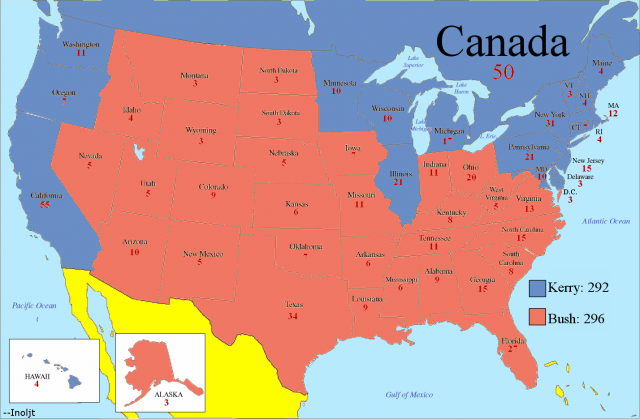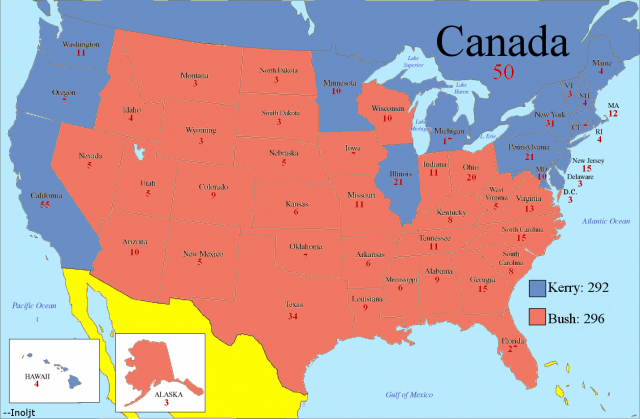This is the second (more serious) part of two posts exploring the political consequences that would happen if Canada became part of the United States. The previous part can be found here.
A note to all Canadian readers: this post was written for the intent of a good laugh, and some serious political analysis along with it. It is not meant to offend, and sincere apologies are offered if any offense at all is taken.
More below.
How Important Would Canada Be?
The previous post looked at what would have happened in the 2004 presidential election if Canada had been part of the United States:
Democratic candidate John Kerry wins, but barely so. If 6,000 votes had shifted in Wisconsin, here is what would have happened:
Suddenly President George W. Bush is re-elected again.
This example probably overstates the importance of Canada. Canada’s Democratic vote would probably have sent Vice President Al Gore to the White House. But before that, one has to go all the way back to 1876 to find an election when the result would have been changed by Canada voting Democratic. Indeed, before 2000 the last time it matters which way Canada votes comes in 1916.
America’s presidents would mostly have been the same with or without Canada.
Here is another way to look at the picture. In the 2008 presidential election, a total of 131.2 million Americans voted. In the same year Canada held federal elections, in which 13.8 million Canadians voted. If one assumes that the same number of Canadians would vote in an American presidential election, one can make the table below:
| If Canada Votes… | Then Barack Obama Gains: |
| 100% Democratic | 9.53% |
| 90% Democratic | 7.70% |
| 80% Democratic | 5.83% |
| 70% Democratic | 3.93% |
| 65% Democratic | 2.96% |
| 60% Democratic | 1.98% |
| 55% Democratic | 1.00% |
To be fair, these are not bad figures for Democrats. An increase of three percent in one’s popular vote is nothing to sniff at. At the same time, however, it is nothing world-altering.
Let’s take a look at the 2010 midterm elections. 87.8 million Americans voted for a congressional representative, and Republicans won that vote nationally by 6.8%. One can run the same numbers with Canada’s 2008 federal elections to get:
| If Canada Votes… | Then Republicans Win By: |
| 100% Democratic | -6.81% |
| 90% Democratic | -4.24% |
| 80% Democratic | -1.60% |
| 70% Democratic | 1.12% |
| 65% Democratic | 2.51 |
| 60% Democratic | 3.92% |
| 55% Democratic | 5.35% |
This indicates that Democrats would have needed around about three-fourths of the Canadian vote to tie in the 2010 popular vote.
Conclusions
A Canadian 51st state of the United States would not change American politics enormously. Ultimately Canada is just not populated enough to fundamentally alter the status quo.
To be sure, the Democratic Party would probably do a bit better initially. Liberal policies would be a bit more popular; conservative policies a bit less so. Canada would help Democrats in the House of Representatives, probably giving them around two dozen extra representatives (although Democratic strength would probably be diluted by the Quebec independence vote). On the presidential level, Democrats would need the Midwest a bit less. They could win with the John Kerry coalition – but barely so.
The beauty of the two-party system, however, is that the Republican Party would eventually adjust. It would move leftwards, much as it did after the New Deal or Democrats moved rightwards after the Reagan years. Eventually, after adopting more liberal policies, the two parties would again approach equilibrium.
Now…it’s a whole different story if Mexico was part of the United States (and not necessarily one that Democrats would like).
–Inoljt


if you went all the way back to 1876 the American political system was different enough that large parts of Canada would be solid Republican, particularly the northeast. Remember, the Democrats used to be the policy of white Southern slavery, which definitely wouldn’t have gone over well in most of Canada (aka fugitive slave central) at the time.
As for the rest, I’m not entirely convinced that your conclusion is accurate. As I said when I crunched the numbers James provided in your last Canada thread, Calgary’s 79-21 Obama landslide puts it on par with Portland, Oregon (77-21) and Alberta as a whole would’ve been about 68% Obama, which is one point more Democratic than Vermont. Canada (and the rest of the world, for the most part) is pretty solidly liberal in a way that Americans can’t really comprehend because our Overton window has shifted so far to the right. I think having those 50-odd electoral votes on our side would really help things, assuming, of course, that Canada remained as liberal as it is now if it had become a part of the US, which is a very big assumption to make.
I think Canada would get about the same attention as New York or California. Although its 50 or so points would be a big win, I don’t see Republicans spending their time trying to win there.
Alberta and Saskatchewan would be dark red states. Manitoba and British Columbia would be swing states, maybe Ontario would be in play too.